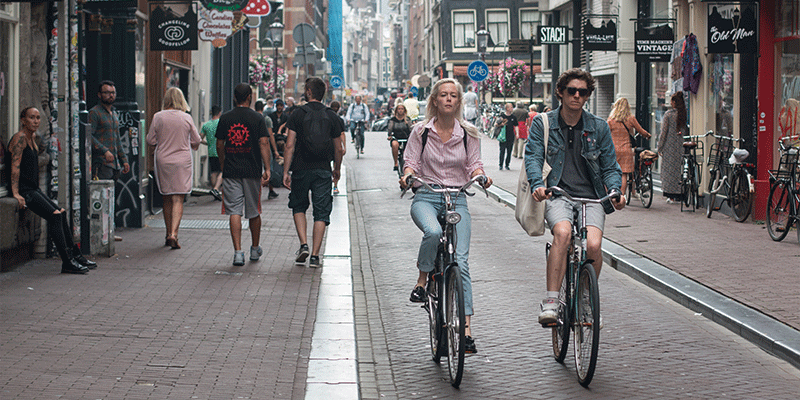Launched in 2012, YourStory's Book Review section features over 270 titles on creativity, innovation, entrepreneurship, and digital transformation. See also our related columns The Turning Point, Techie Tuesdays, and Storybites.
The Startup Guide series of books, launched in 2014 by Copenhagen-based publisher Sissel Hansen, covers over 25 cities such as London, Los Angeles, Lisbon, Oslo and Miami. See our reviews of the guidebooks for New York, Berlin, Munich, Zurich, Paris, Barcelona, Stockholm, Vienna, Johannesburg, Cairo, Tokyo, Bangkok, and Singapore.
Startup Guide Amsterdam is spread across 250 pages and makes for an informative and entertaining read, with profiles of founders, co-working spaces, incubators, and other ecosystem players.
“Amsterdam is best known for its picturesque canals and top-notch museums, but it’s no secret that the capital of the Netherlands is also a hotspot for some of the most forward-thinking entrepreneurs and creatives in Europe,” Sissel Hansen begins.
“Amsterdam has always been home to liberalism, enterprise, tolerance, and diversity,” says Femke Halsema, Mayor of Amsterdam.
Notable innovative players from Amsterdam include Booking.com, WeTransfer and Adyen; social enterprise Fairphone; and global accelerators such as Startupbootcamp and Rockstart.
The Startup Genome report recently ranked Amsterdam as one of the top 15 startup ecosystems worldwide and one of the top five in Europe. The Global Innovation Index 2019 put the Netherlands in fourth place as a world leader in innovation.
The Amsterdam ecosystem accounts for more than 1,600 tech companies, with 1,346 home-grown companies. Startups and tech firms account for about 13 percent of Amsterdam’s job market. As a home to software developers in Europe, Amsterdam is excelled only by London and Paris, according to cited research.
Overview
One section provides an overview of the city’s environment and lifestyle, such as city (scenic), culture (open, tolerant), people (modest, outspoken), expats (plentiful), work-life balance (excellent), public transport (well-connected), bicycles (plentiful but stolen often), rents (high), taxes (high), and language (bilingual, with English widely spoken).
Its greater metropolitan population is around 2.5 million. Amsterdam is a pocket-sized global city with a small-town charm. Sometimes known as the ‘Venice of the North’, Amsterdam is famed for its intricate network of picturesque canals. It offers much more than its ‘coffee’ shops and the Red Light District.

I. Startup profiles
One section of the book profiles 11 startups based in Amsterdam, with inspiring origin stories and business descriptions. They include felyx (shared electric scooters), bloomon (flower-delivery, with subscription service) and Quicargo (online cargo-matching platform).
Foodlogica supplies locally sourced, organic and high-quality food. Healthy Workers gives companies data-driven insights on how to improve employee well-being.
Pacmed uses machine learning to improve allocation of healthcare resources to patients based on treatment patterns. Hiber provides connectivity for IoT devices in rural areas using nano-satellite devices, for industries like agriculture, insurance, oil and gas.
Ligo is a legaltech platform that automates signing and management processes for legal documents. SwipeGuide offers SaaS tools for companies to create and track digital manuals for work instructions and standard operating procedures.
Bunq is an independent bank that offers services via mobile devices. Bundleboon is an online curated shopping service specialising in kidswear.
Many of the funders benefited from initiatives like Startupbootcamp, the Leapfunder online platform for angel investors, crowdfunding platform Eureeca and the Dutch Legal Challenge award.
II. Startup ecosystem
One section of the book profiles the support system for startups, ranging from incubators to accelerators.
Rockstart, regarded as one of Europe’s first startup accelerators, is now present in other cities like Nijmegen, Den Bosch, Copenhagen, and Bogota as well. It focuses on energy, health, agrifood, and emerging tech, and counts Maersk and Shell as partners. Its portfolio startups include 3D Hub (on-demand manufacturing) and Owlin (news analysis tool for traders).
Startupbootcamp was founded in 2010 by Patrick De Zeeuw and Ruud Hendriks, and is now present in London, New York, Singapore, and Berlin. It has over 20 programmes in sectors like media, fintech and cybersecurity, and commerce. It has accelerated over 800 startups worldwide, including 150 from Amsterdam.
Business incubator ACE has partnered with a number of universities for technology and science-based ideas. It runs a three-month incubation programme called Ready to Start. Portfolio startups include Macrobian Biotech (which as has developed a compound to treat Parkinson’s Disease) and Enpicom (biomedical software to analyse autoimmune diseases).
Arcadis City of 2030 Accelerator has a three-month programme for startups powered by Techstars, both of whom share a total of six percent equity of a startup. It focuses on urban environmental solutions and workspaces.
Fashion for Good supports sustainability through circular design. It wants to reduce practices like the discarding of 60 percent of clothing that get burn or end up in landfills. It was founded in 2017 with support from the C&A Foundation.
Kitchen Republic Academy runs a twelve-week food-entrepreneurship programme with twelve chefs, farmers, and food producers in each cohort. Portfolio companies include Oma’s Soep, a soup company that combats loneliness and food waste; and KRUSLI, a muesli brand that launched at national retailer Deen.
Startup in Residence is a collaboration between the City of Amsterdam and a group of entrepreneurs. It was inspired by a visit to an entrepreneurship-in-residence programme in San Francisco, and focuses on climate solutions.
Managers of these institutes offer a range of tips for founders, ranging from commercial validation to traction. Founders should truly fall in love with the problem, focus on adding value for customers, and believe in the greater good.
It is important to be malleable to change under guidance from mentors and co-creation with partners. The startup team should have a good balance of skills, a harmonious way of working, and culture fit. Patience is called for while dealing with government partners.
III. Co-working spaces
Amsterdam has a number of co-working spaces, some of which specialise in certain sectors like social innovation or creative sectors. They include B. Amsterdam, spread across four buildings: B.1, B.2, B.3 and B. Smart City Hub.
A Lab is combination of a foundation and coworking space designed for tech and social entrepreneurs. Epicenter Amsterdam has a startup and corporate community focused on digital innovation.
Located inside the Royal Tropical Institute building, Impact Hub Amsterdam combines a collaborative space with workshops and acceleration programmes focused on sustainability. The “innovation space with a social conscience” focuses on inclusion, circular economy and reduction of plastic usage.
The Startup Village, located in Amsterdam’s Science Park, is part of the ACE (Amsterdam Centre for Entrepreneurship) Incubator. It has a strong focus on STEM startups.
TQ was launched by the team behind TNW Conference, the regular event of tech website The Next Web. Volkshotel is regarded as a “bohemian hub” for artists, DJs and photographers. Other notable coworking spaces are StartDock Amsterdam, Mindspace and rent24 Magna Plaza.
Each description also profiles key organisers of these spaces, called ‘Face of the Space.’ For example, Douwe Dirks is the country manager for the Netherlands at Epicenter; he is also an entrepreneur and has had multiple exits. He was earlier head of digital and innovation at J. Walter Thompson.
IV. Expert insights
One section of the book provides tips from six experts, covering market expansion, industry connects, talent, and legal issues.
“Trust people to learn from mistakes. Your team members will need to experience mistakes in order to make better decisions in the future,” advises Roline Spijkervet, Head of Talent Acquisition at online supermarket platform Picnic.
“If you micromanage your people, they won’t have the courage to take risks. Give your team trust, so they can grow,” she adds.
“I would really recommend founders to do some interview training beforehand,” advises Laura Quick, Co-owner and Executive Director of Adams Multilingual Recruitment. It is important for founders to pick the right team, and should be clear on goals and cultural environment.
Founders should seriously consider legal and IP issues like registering trademarks, design rights and domain names, advises Alphons Geerlings, Founder and General Manager of law firm de Merkplaats.
“Think like a lawyer; don’t act like one,” advises Florestan van’t Hek, Cofounder at entrepreneurial law firm VentureLawyers. It is important for founders to document crucial decisions and agreements in the form of contracts.
“Expanding into new countries is a significant challenge for fast-growing companies, which is why it’s essential to build a good network,” recommends Michael van den Assem, Managing Director for the Netherlands at Interxion. It offers a network of data centre services in Europe.
“We want to keep the city inclusive for young entrepreneurs and people from abroad,” says Bas Beekman, Director of StartupAmsterdam. It is an ecosystem builder created by the City of Amsterdam to support entrepreneurs via activities like events.

V. Founder advice
The book features interviews with founders of five startups. The profiled founders trace their entrepreneurial journeys, lessons learnt, and tips for the next wave of aspiring entrepreneurs.
Boris Veldhuijzen van Zanten and Patrick de Laive are founders of TNW, which began as a meetup and grew into the media outlet, thenextweb.com and the tech festival.
“If you project ten years down the line and work back until the present, you get what you need to do in order to get there,” Patrick advises.
Diane Janknegt spent many years at Microsoft and then founded education platform Wizenoze. It gives students access to reliable and relevant online information at the correct reading level, based on machine learning techniques.
“Managing $450 million in an established business is, believe me, ten times easier than selling your first $1 million from nothing,” she recalls. “Two or three really good hires can attract the rest of the organisation,” she suggests.
“The education sector is one of the most fulfilling sectors because you’re doing something for children and students. It’s also one of the worst sectors to be in. It’s super slow moving, the prices are under huge pressure, and no one wants to pay,” Diane laments.
Mariah Mansvelt-Beck is the cofounder of femcare startup Yoni, which produces organic-cotton tampons, pads, and liners. She realised the need for such products when she herself developed cervical cancer.
“Talk about your idea to other people who know more than you about that specific area,” she advises. Mariah believes people should integrate and not compartmentalise their professional, social, and spiritual lives.
Robert Vis founded MessageBird as a cloud-communications platform that helps businesses with customer messaging. He earlier founded mobile payment platform ZayPay.com, which was acquired by the Mobile Interactive Group. He also launched a venture fund called SILDI Ventures.
“We have to keep one foot planted firmly in what businesses and customers want today while always keeping an eye to the future,” he advises. “European startups have a higher burden to prove a sustainable business model than US-based companies,” he observes.
“You have to find the right people and trust that even if they don’t do it exactly your way, it can still work. Letting go is the hardest part,” Robert advises aspiring founders. Continuous performance enhancement comes from seeking unbiased feedback and keeping on raising the bar for oneself and those around.
Thalita van Ogtrop and Lieke Pijpers founded circular economy startup The Next Closet as a sustainable marketplace for second-hand fashion items. “You have to get talent in earlier so you’re not reinventing everything, because that slows your pace,” Thalita advises.
“Invest in your people. People are everything,” she adds. She is also a strong advocate of the power of positive storytelling.
The featured founders appreciate Amsterdam’s startup ecosystem for being “cozy and homey.” Amsterdam is an international but manageable city, and “close to paradise” for those who want to raise a family.
Because the city is small, it forces startups to think globally from the start. The city’s diversity helps understand how to serve a global customer base.
VI. Schools
One section of the book profiles the entrepreneurship programmes of the city’s universities, as well as a growing crop of coder training institutes.
“The mission statement of the university is to ‘create tomorrow together’,” says Bart van Grevenhof, Programme Manager of Entrepreneurship at Amsterdam University of Applied Science (AUAS).
“Our courses aren’t a handbook for students to become an entrepreneur but to become entrepreneurial,” says Dr Bram Kuijken, Co-director of the Master Entrepreneurship programme at Amsterdam Business School.
Codam Coding College was founded in 2018 by Corinne Vigreux, the co-founder of TomTom. Codam is part of the network of the coding school 42, which has schools in more than ten locations worldwide.
Codaisseur, founded by Wouter de Vos, is the first coding bootcamp in the Netherlands. It offers a two-year Junior Acceleration Programme. HackYourFuture is another coding school addressing the growing demand for skilled developers in the Netherlands and an influx of skilled refugees.
Digital training and talent provider Growth Tribe works as a hiring partner for fifty scale-ups in Amsterdam. Inholland University of Applied Sciences gives students the opportunity to participate in two internships, both in the Netherlands and abroad.
The Talent Institute was co-founded by Roderik Hageman and the founders of Startupbootcamp in 2015. Founded in Finland in 1993, Team Academy is a global learning community which set up base in Amsterdam in 2014.
Advice given by programme heads of these schools includes the importance of originality, a spirit of experimentation, and a strong conviction to achieve. Having a long-term vision and an international outlook helps survive the long and tough journey of entrepreneurship.
Founders should be driven self-learners and self-starters, and be open-minded and agile. A balance between hard and soft skills helps. Founders should do side projects to explore their strengths, and should not have fear of failure.
Entrepreneurs should embrace uncertainty and not be afraid to venture into the unknown and find their way as they go. All these experiences are a part of the growth and innovation mindset.
VII. Investors
The last section of the book profiles nine investing firms, along with sample portfolios and advice for founders.
With roots in the Netherlands, Finch Capital has expanded across Europe and Southeast Asia. With a focus on fintech and deeptech, it has invested in Grab (ride-hailing app), Twisto (digital payments company) and Hiber (IoT platform).
Peak Capital invests in European marketplace, platform and SaaS startups. “The best time to start a company is during an economic downturn,” says its co-founder Johan van Mil. Its portfolio includes Catawiki, Channable, StuDocu, InvoiceFinance, and Radionomy. Notable exits include IENS (sold to Tripadvisor), Radionomy (to Vivendi), and CheapCargo (to PostNL).
Prime Ventures is a pan-European venture-capital and growth-equity firm supporting fast-growing tech startups. It has invested in over 60 companies including travel marketplace Tripaneer.com, AI-driven photography platform Meero, online food-delivery platform Takeaway.com, and application development platform Mendix (sold to Siemens).
Slingshot Ventures’ portfolio includes Temper, an online marketplace for freelancers; Wasteless, a dynamic pricing solution for supermarkets; VanMoof, which makes smart-city ebikes; and Boldking, an online male-grooming platform.
INKEF Capital focuses on Series A investments in technology and healthcare companies. With a 20-year horizon on the fund, its portfolio includes GitLab (DevOps tool) and bloomon (flower-delivery subscription).
DOEN is an early-stage VC in green and social enterprises. It is managed by the DOEN Foundation, which was set up by the Dutch Charity Lotteries. Its portfolio includes Fairphone, Seepje and De Prael. One of its exits is The New Motion, which provides electric vehicle charging solutions.
henQ invests in European B2B software startups. ASIF (Amsterdam Student Investment Fund) Ventures is a student-run VC firm. Keen Venture Partners is based in Amsterdam and London, and invests in Series A and Series B rounds.
The investors offer a range of tips for founders. Boldness is important, along with an ability to build an ambitious, skilled, and diverse team. It helps not to be too patient, and to be able to communicate a realistic idea well by using facts and not buzzwords or data dumps.
Goals should be achievable, with demonstratable traction and clear milestones. Deep understanding of customers, markets and competition is essential. It is important to get the timing right and not just build a world-class product.
The offering should have a great brand, and be part of a megatrend, not a fad. The business model should be sustainable and scalable.
Founders should be able to quickly capture the attention of investors and be transparent in dealings. They should listen to feedback and show they value advice by digesting and applying it. Funding is about building a relationship based on trust.
The book ends with a four-page glossary of terms and a directory of useful resources for startups, such as investors, meetups groups and events.
For example, forums and events include The Next Web Conference, World AI Week, Money2020, Amsterdam eWeek, Amsterdam Drone Week, Amsterdam Capital House, European Women in Tech Conference, The Next Women Pitch Events, rEVolution, TEDxAmsterdamWomen Startup Awards, Expat Republic, Expatica, and International Locals.
In sum, the book provides informative and entertaining insights into Amsterdam’s startup ecosystem, as well as a useful framework for other cities to reflect on and improve their own startup ecosystems.
YourStory has also published the pocketbook ‘Proverbs and Quotes for Entrepreneurs: A World of Inspiration for Startups’ as a creative and motivational guide for innovators (downloadable as apps here: Apple, Android).
Edited by Megha Reddy
Link : https://yourstory.com/2020/10/startup-guide-amsterdam-entrepreneurship-ecosystem
Author :- Madanmohan Rao ( )
October 16, 2020 at 07:10AM
YourStory



